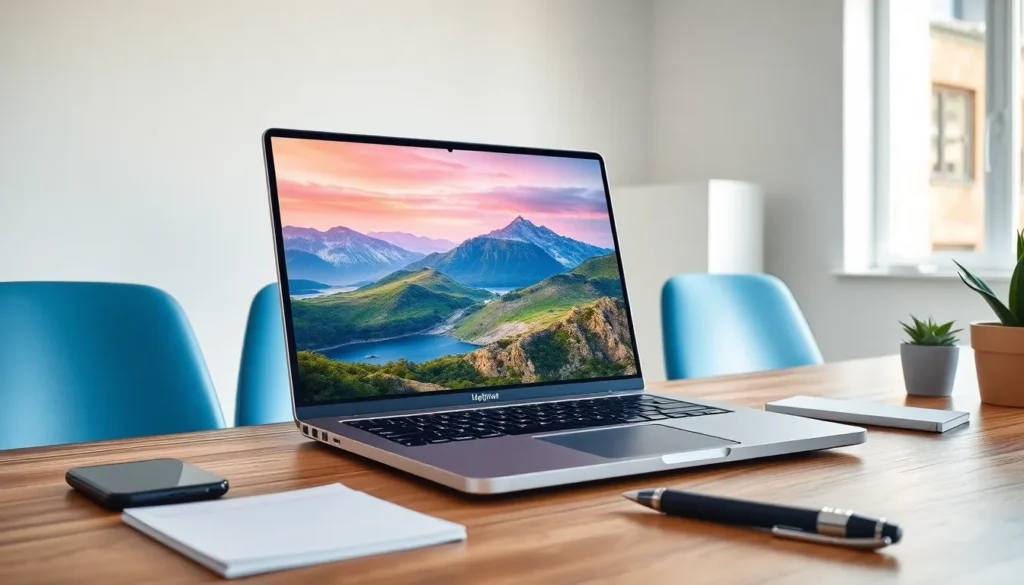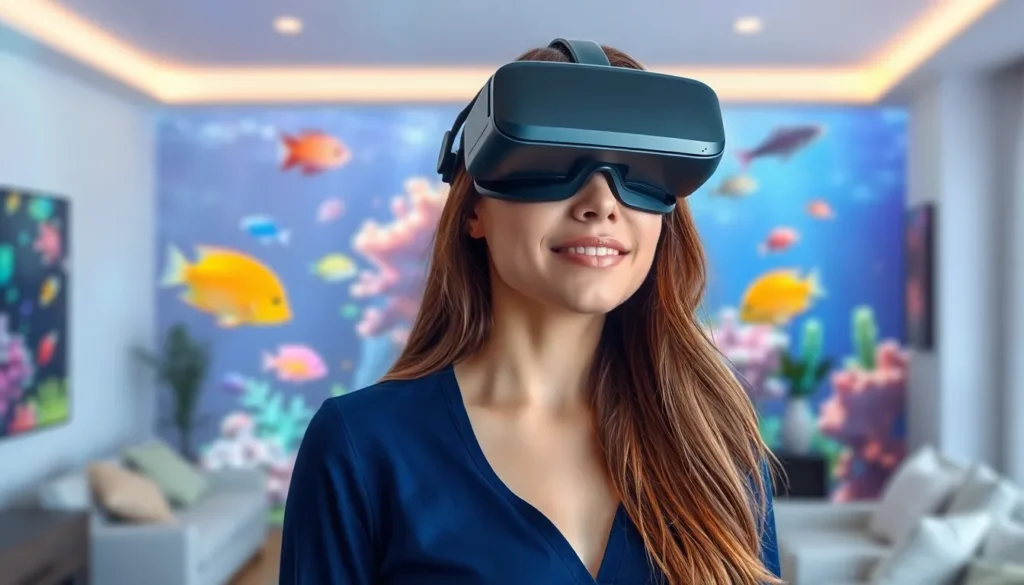In a world where laptops have become as essential as coffee, the future of these gadgets is brewing up some exciting possibilities. Imagine a laptop that knows your mood, adjusts its display based on the lighting, and even reminds you to stretch during those marathon work sessions. Sounds like science fiction? Well, it’s closer than you think.
Table of Contents
ToggleOverview of Laptop Futures
The future of laptops presents innovative features reshaping how users interact with technology. Companies are developing laptops that can sense a user’s mood, enabling customization that enhances productivity and comfort. Adaptive displays automatically adjust to environmental lighting, ensuring optimal visibility and reducing eye strain.
Sensors integrated into devices could prompt users to take necessary breaks during extended work sessions, promoting healthier work habits. The potential for increased battery life through energy-efficient components allows users to stay connected without frequent recharging.
Foldable and dual-screen designs are gaining traction, providing versatility for multitasking and enhancing the overall user experience. Voice activation and AI assistance will likely streamline processes, allowing for hands-free operation that simplifies daily tasks.
Emerging materials, such as graphene, promise lightweight and durable builds, marking a move away from traditional laptop designs. Enhanced security features, including biometric authentication, will bolster data protection, ensuring users feel safe while using their devices.
Wireless charging capabilities may also become standard, minimizing reliance on traditional power outlets. As these advancements unfold, the integration of augmented reality could transform interactive experiences, allowing users to blend digital content seamlessly with the real world.
Anticipation surrounds the next generation of laptops, showcasing possibilities that enhance convenience and efficiency. Manufacturers are committed to groundbreaking developments, signaling an exciting evolution in portable computing.
Current Trends in Laptop Technology

Current trends in laptop technology reveal rapid advancements that enhance user experience and performance. Innovations span across hardware improvements and software developments, reflecting the industry’s commitment to progress.
Advancements in Hardware
Laptops now include advanced processors, such as Apple’s M1 and M2 chips, delivering exceptional speed and efficiency. Manufacturers focus on integrating energy-efficient components, significantly boosting battery life. Lightweight materials, like magnesium alloy and graphene, contribute to portable designs without compromising durability. Dual-screen configurations and foldable displays promote multitasking capabilities, offering users more screen real estate. Graphics capabilities improve with dedicated graphics cards, enabling better support for gaming and creative applications.
Innovations in Software
Software innovations enhance productivity and user experience. Operating systems increasingly feature tools for seamless multitasking and collaboration, such as split-screen functionalities. AI-driven features allow devices to adapt to user behavior, optimizing performance based on usage patterns. Security software prioritizes user protection, integrating biometric authentication and advanced encryption methods. Regular updates ensure the operating systems stay secure and introduce new functionalities, maintaining competitiveness in the market. Voice recognition simplifies tasks, enhancing accessibility and efficiency across various applications.
The Impact of Remote Work on Laptop Futures
Remote work significantly influences the future of laptops. Increased flexibility demands advanced features that enhance productivity and user comfort.
Changes in Consumer Demand
Consumer preferences shift towards devices that support remote work environments. Lightweight and powerful laptops now attract attention due to their portability and performance. Many users prioritize longer battery life, as extended sessions without charging become essential. Companies observe increased interest in touch screens and stylus compatibility, enhancing creativity and interaction. Higher demand for better webcam quality arises as virtual meetings maintain popularity. Enhanced audio capabilities also cater to users’ needs for clearer communication. Manufacturers respond by integrating advanced components, ensuring that laptops meet the evolving expectations of professionals.
The Rise of Portable Solutions
Portable solutions gain momentum amid remote work trends. Compact designs with powerful specs appeal to a broad range of users. Dual-screen laptops and foldable models support multitasking, allowing seamless transitions between tasks. Innovations like lightweight materials ensure that portability does not compromise performance. Consumers seek devices that easily connect to wireless networks, enhancing productivity on the go. Creation of adaptive displays caters to varied working environments, accommodating different lighting conditions. Enhanced cooling systems contribute to overall efficiency, minimizing any performance downgrades in portable setups. The market places a strong emphasis on versatility, aligning with the growing emphasis on remote capabilities.
Environmental Considerations for Laptop Futures
The future of laptops includes important environmental factors that demand attention. Innovations in sustainable practices and e-waste management are vital for creating a more eco-friendly computing landscape.
Sustainable Manufacturing Practices
Sustainable manufacturing practices focus on reducing environmental impact during laptop production. Companies are increasingly adopting renewable energy sources, minimizing water usage, and using non-toxic materials. By integrating recycled raw materials, manufacturers can cut down on resource extraction. Assessments of carbon footprints guide firms in identifying areas for improvement. Leading brands prioritize supply chain transparency, ensuring ethical sourcing and reducing waste in their operations.
Recycling and E-Waste Management
Recycling and e-waste management contribute significantly to sustainability efforts in the tech industry. Proper disposal of laptops prevents harmful chemicals from leaching into the environment. Many manufacturers offer take-back programs that encourage users to return old devices, allowing for parts recovery and material reuse. Compliance with regulations ensures responsible recycling practices are followed. Increased public awareness about e-waste creates more opportunities for recycling initiatives, fostering a culture that values electronic sustainability.
The future of laptops is bright and filled with possibilities that promise to enhance user experience significantly. As technology continues to evolve rapidly the integration of AI and adaptive features will redefine how people interact with their devices. Lightweight materials and innovative designs will cater to the growing demand for portability without sacrificing performance.
Sustainability will play a crucial role in shaping the industry as manufacturers adopt eco-friendly practices and prioritize responsible production. With advancements in security and user comfort the next generation of laptops will not only meet the needs of remote work but also contribute positively to the environment. This exciting evolution sets the stage for a new era in portable computing that aligns with modern lifestyles and values.





